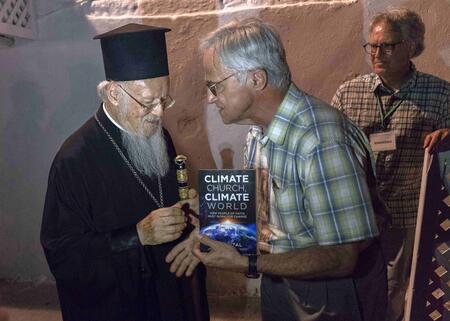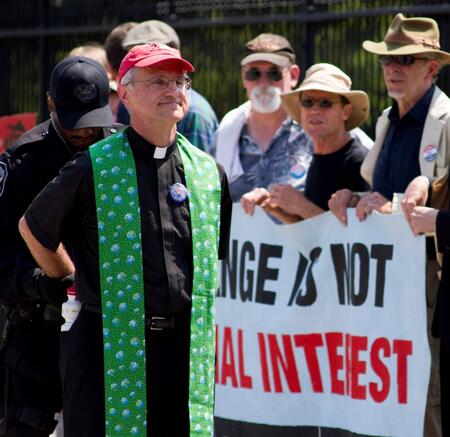By Kim Lawton
The Rev. Jim Antal ’78 M.Div. fondly remembers the first Earth Day, on April 22, 1970, when he was an undergraduate at Princeton University. As someone who loved nature and had a passion for social justice activism, Antal says he was deeply inspired by the nearly 20 million people who took to the streets at Earth Day events around the world. He discovered what he describes as his “life’s work”: advocating for environmental justice.

People of faith are “beginning to realize that it’s not just that cranky person dressed in green who keeps hollering every April and then we can ignore him the other 11 months,” Antal says. “All of us are involved in this. We have to change our ways, and we have to do it now.”
Antal is one of the nation’s leading faith-based voices on climate change, which he calls the “greatest moral crisis” of our time. He is Special Advisor on Climate Justice to the United Church of Christ (UCC) General Minister and President and author of the newly revised book, Climate Church, Climate World: How People of Faith Must Work for Change.
The book was first released in late 2018, but Antal says he realized he already needed to update the science on climate change. “The book is littered with science, and that’s because I come from a very geeky background,” he says, noting that his brother was a “world renowned scientist” and his father was a leading chemical engineer for Mobil Oil.
Antal also wanted to update the sections of the book that describe how churches and other religious institutions are responding to the call to address climate change. “Religious bodies throughout the United States are waking up more and more and more every week,” he says.
Jim Antal speaking at YDS alumni/ae event in Minneapolis April 23: Learn more.
One of the book’s most provocative assertions is that when it comes to climate change, people of faith need to expand their concept of the Golden Rule and what it means to treat their neighbors as they themselves would want to be treated. When Jesus and the founders of other religions were alive, Antal says, the definition of neighbor was those who lived nearby.
“It turns out, that’s inadequate,” he states. “Everybody who is alive today, our actions and the choices we make…will have an impact for thousands of years on the earth and on subsequent generations.”
Therefore, Antal continues, the Golden Rule should be expanded “to include future generations as morally relevant every bit as much as…how you treat your current neighbor.”
 Antal further argues that faith communities have a moral obligation to address climate change because “this isn’t just one justice issue among many.” Climate change, he says, has an impact on global crises including hunger, refugees, racism, poverty, inequality, pandemics, and war.
Antal further argues that faith communities have a moral obligation to address climate change because “this isn’t just one justice issue among many.” Climate change, he says, has an impact on global crises including hunger, refugees, racism, poverty, inequality, pandemics, and war.
“It amplifies all of the justice concerns that we in our faith perspective communities have cared about for thousands of years,” he says, adding that “the poorest people” are usually among the most adversely affected.
Antal believes some of the movement in the faith community on the issue of climate change can be attributed to the leadership of Pope Francis, who released a strong encyclical letter on the environment, Laudato Si: On Care for Our Common Home, in 2015. Antal also commends recent statements from Ecumenical Patriarch Bartholomew, spiritual leader of 300 million Orthodox Christians worldwide. Bartholomew is sometimes called “the Green Patriarch” because of his outspoken advocacy on climate change.
Antal says his own concern for the environment began in his youth. His parents were divorced, and at age 15, he changed custody from his mother to his father. “To get to know each other, my father took me on a tour of the national parks, which I had never seen,” Antal recalls. “I just fell in love with the grandeur, beauty, and miracle of nature.”
He easily connected that love of nature to his Christian faith. Says Antal: “It was always clear to me that the earth is the Lord’s. Full stop.”
Antal attended YDS from 1972 to 1978. At the time he realized he wanted to pursue a Ph.D. in environmental ethics. However, that was not a recognized subject in those days. “I had to get special permission in the theology department, and they had no one to advise me,” he says.
Prominent scholar John E. Smith, Clark Professor of Philosophy at Yale, stepped in and agreed to become Antal’s advisor. Antal earned his M.Div. degree but did not finish his environmental ethics dissertation. Still, he says, he appreciates the school’s receptivity to his passion.
“Now almost every religious institution, seminary, or religious studies institution has some focus on environmental justice, recognizing that it is a core issue…for people training to be religious leaders to be focusing on,” he says.
Antal has high praise for YDS’ groundbreaking Living Village project, which will provide affordable housing for students in a net-positive-energy building. The ecologically sustainable structure will have a zero-carbon footprint that use solar power and employ the most advanced sustainable water practices. Construction is expected to begin later this year and will use only recycled and environmentally friendly materials. The Living Village will be the largest housing complex on a university campus that adheres to the rigorous standards of the Living Building Challenge.
“This living building is going to be a signal to not just the entire Yale constituency, but the entire constituency of elite educated leaders, that we actually have to change our infrastructure, and we have to do it immediately,” Antal says.
When he attended YDS in the ’70s, Antal says, “it was obvious that the buildings of the courtyard were in disrepair.” He says he raised questions with YDS leaders about the responsibility for capital upkeep.
“They responded that they were academics, focused on the head and the heart and not so much on the concrete and brick and mortar,” recalls Antal, who currently serves on the YDS Alumni Board. The Living Village, he says, will provide a “profound witness” to a different way of thinking, declaring that “ even though we are an institution concerned about head and heart and we use texts that are 2,000 years old, we need to employ the most current science in order to change the fundamental ways in which we live.”
YDS Living Village and architecture for the future: Podcast interview with Living Building Challenge founder Jason F. McLennan
Antal’s witness on climate change has been high-profile—and sometimes controversial—from his days as a local UCC pastor in Ohio and Massachusetts to his tenure as a state and national denominational leader. He has participated in numerous protests against the Keystone XL pipeline, fossil fuels, fracking, and other environmental threats. He’s been arrested at protests more than a dozen times.
“We need to make civil disobedience a normative expression of Christian discipleship every bit as much as prayer,” he argues. “I don’t know if we’re going to make the changes that science says we must unless that kind of commitment and urgency from the people is registered.”
Antal is a frequent speaker on climate change. This year, the UCC launched a new annual Earth Day virtual summit. To honor Antal, going forward, the summit will feature what the denomination has named the “Jim Antal Keynote Lecture.”
After decades of activism, Antal acknowledges he is sometimes frustrated by how slowly things change, even as the climate situation continues to deteriorate. Still, what gives him hope, he says, is a “generation of young people whose patterns of life are not yet etched in stone…and who are willing to say, ‘We recognize everything has to change, and we’re up for it.’”
Kim Lawton is an award-winning reporter, producer, and writer who has worked in broadcast, print and online media. Lawton is also a Journalist Fellow with the University of Southern California’s Center for Religion and Civic Culture. For nearly 20 years, Lawton was Managing Editor and Correspondent for the highly acclaimed national public television program “Religion & Ethics NewsWeekly.”
Additional resources:
“Every religious leader must preach on climate change”: Jim Antal ’78 M.Div. | YDS podcast
The Green New Deal: A General Synod Progress Report - United Church of Christ (ucc.org)
Laudato Si: On Care for our Common Home | USCCB
Pope Francis Joins Climate Fight | UNFCCC
Religions and environmental protection | UNEP - UN Environment Programme
What Is The Living Building Challenge? - International Living Future Institute (living-future.org)